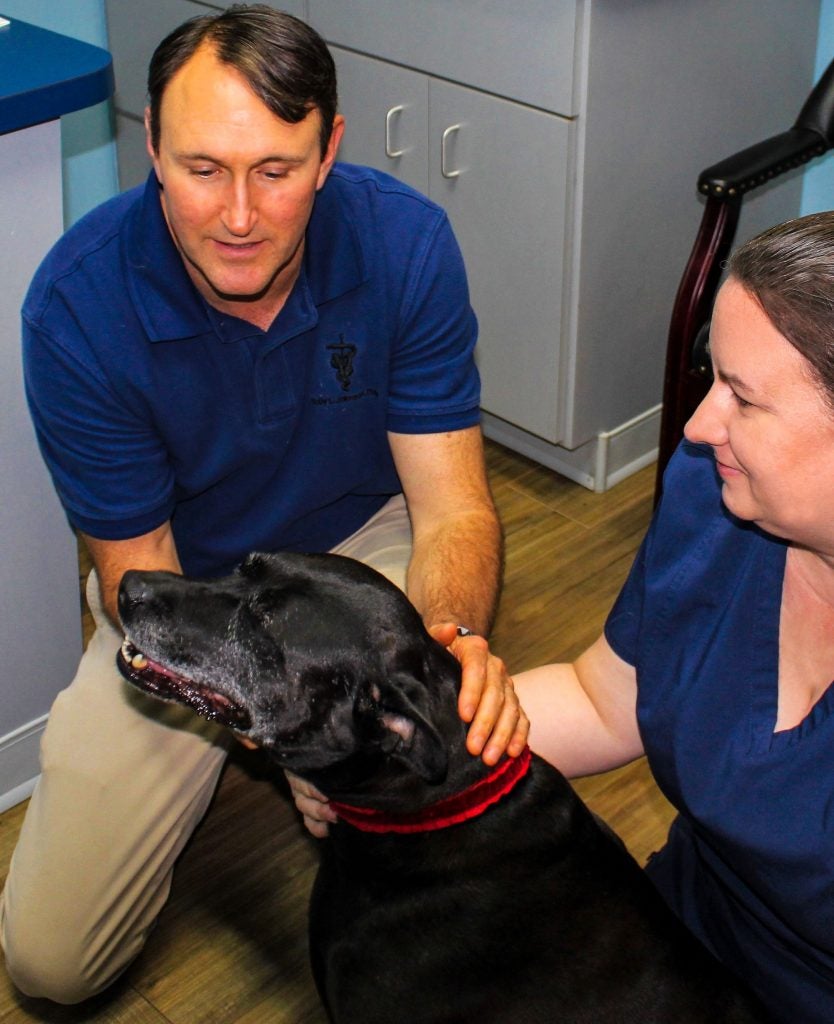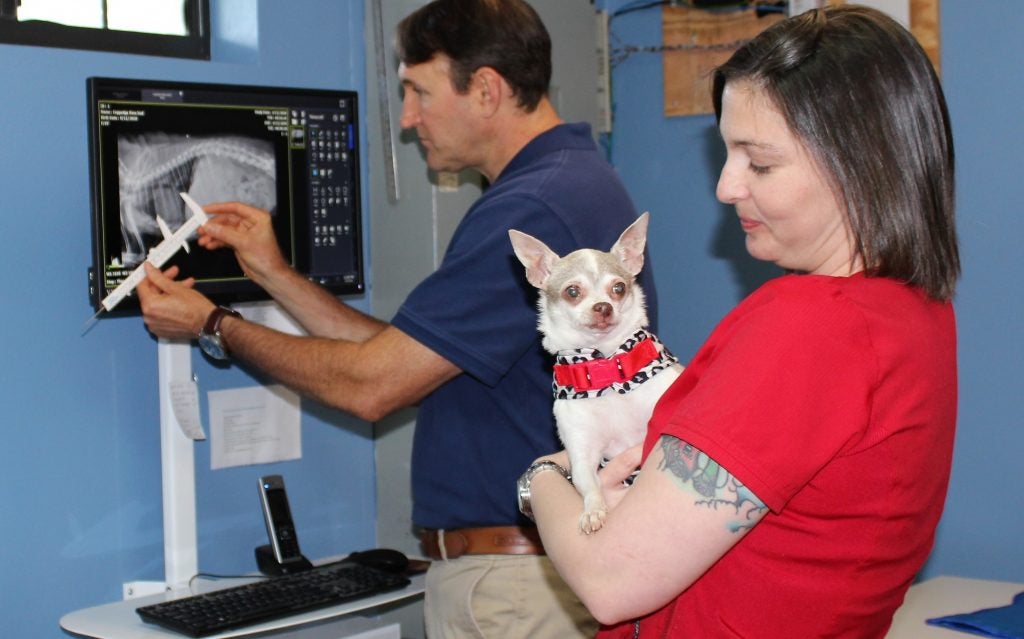Preventative Care
Preventative Care
Silver Springs Shores Animal Hospital provides comprehensive general pet services in Ocala, FL. Our veterinary visits include providing personalized vaccinations based on the latest research, in-house Xrays, parasite testing, urinalysis, diagnosing and treating skin and ear issues, dental and extractions, and much more. We can run ear and skin cytology in-house to diagnose itchy skin and ear issues that may be aggravating your pet. We also offer in-house bloodwork and can get the results while you wait. We also do anal gland expression, nail trims, ear cleaning, and ear plucking. At Silver Springs Shores, we treat every pet like family and handle anything from exams and vaccines to surgery or hospitalization. We also feature a wide variety of flea, tick, and heartworm preventatives along with prescription diets.
If you’re interested in working with a seasoned vet who treats your furry loved ones with unmatched compassion, please give Silver Springs Shores Animal Hospital a call today at (352) 687-3866. Thank you!
Kittens and Cats
- Rabies: Can be administered in one dose as early as 3 months of age. Boosters are required at 1 year of age. Then again every year. Core cat vaccine. Rabies is 100% fatal to cats. There is no treatment available. Prevention is key.
- Feline distemper: (panleukopenia) As early as 8 weeks, then every 4 weeks until 16 weeks of age. Given a year after the last dose of the initial series, then once every year. Core cat vaccine. Feline distemper is a severe contagious disease that most commonly strikes kittens and can cause death.
- Feline Leukemia Virus: (FELV) As early as 9 weeks, then 3 weeks later. Booster at 1 year of age, then every year. Non-core vaccine. Should test FELV negative first. Transmitted via cat-to-cat contact. It can cause cancer, an immunosuppressant.
- Feline Herpesvirus: As early as 8 weeks, then every 4 weeks until 16 weeks of age. Boosters are required at 1 year of age, then every year. Core cat vaccine. Feline herpesvirus causes feline viral rhinotracheitis (FVR). A very contagious upper respiratory condition.
- Calicivirus: As early as 8 weeks, then every 4 weeks until 16 weeks of age. Boosters are required at 1 year of age, then every year. Core cat vaccine. A very contagious upper respiratory condition that can cause joint pain, oral ulcerations, fever, and anorexia.

Puppies and Dogs
- Parainfluenza: At least 3 doses, between 8 and 16 weeks of age, 3-4 weeks apart. Puppies need a booster 1 year after completing the initial series, then all dogs need boosters every year. Core dog vaccine. Parainfluenza infection results in cough and fever. It may be associated with Bordetella infection.
- Leptospirosis: Vaccine at 12 weeks and 15 weeks. At least once every year for dogs in high-risk areas. Non-Core vaccine. Vaccination is generally restricted to established risk areas. Lepto is excreted in the urine of animals. Exposure to rodents and standing water can lead to a leptospirosis infection.
- Bordetella bronchispetica (kennel cough): Annual or 6-month boosters may be recommended for dogs in high-risk environments. Non-core dog vaccine. Not usually a serious condition. Although it can be dangerous in young puppies. It is usually seen after activities like boarding, showing, dog parks, and grooming.
- Rabies: Can be administered in one dose, as early as 3 months of age. 1-3 year boosters are required based on the vaccine. Core dog vaccine. Rabies is 100% fatal in dogs with no treatment available. Prevention is key.
- Distemper: At least 3 doses. Given between 8 and 16 weeks of age. Given 3-4 weeks apart. Puppies need a booster 1 year after completing their initial series, Then all dogs need boosters every year or every 3 years if a 3-year vaccine is given. Core dog vaccine. Caused by an airborne virus, distemper is a severe disease that, among other problems may cause permanent brain damage.
- Parvovirus: At least 3 doses, given between 8 and 16 weeks of age 3-4 weeks apart. Puppies need a booster 1 year after completing the initial series. Then all dogs need a booster every year or every 3 years if a 3-year vaccine is given. Core dog vaccine. Canine “parvo” is contagious and can cause severe vomiting and bloody diarrhea. Parvo is almost always fatal if untreated.
- Adenovirus: (Canine Hepatitis): At least 3 doses, between 8-16 weeks of age 3-4 weeks apart. Puppies need a booster 1 year after completing initial series, then all dogs need a booster every year or every 3 years if a 3-year vaccine is given. Core dog vaccine. Spread via coughs and sneezes, canine hepatitis can lead to severe liver damage and death.

In House Laboratory
We provide in house blood testing and diagnostics through IDEXX, which can be done at the time of the visit. We have state of the art equipment which can provide blood counts, serum chemistry, analysis and many of the routine tests that are an important part of veterinary medicine.
The most common lab tests we run in-house include:
- Heartworm and tick-borne disease screening- Blood samples are used to check for the presence of the heartworm, Lyme, ehrlichiosis, and anaplasmosis. Our veterinarians recommend yearly testing and year-round prevention.
- Fecal screening- Stool samples are checked for the presence of intestinal parasites such as roundworm, hookworm, and whipworms.
- Urinalysis- Urine samples can be used to check for several different things. Including the health of kidneys, diabetes, and the presence of infection.
- Thyroid Function- The hormones produced by the thyroid gland can affect a pet’s metabolism and change his or her energy level and ability to maintain a proper weight.
- Feline leukemia-Our vets recommend that all cats be tested for feline leukemia and vaccinated to protect them from this deadly virus.
- Feline immunodeficiency virus (FIV)- This highly contagious virus has no treatment but cats can be kept comfortable and symptoms minimized with early detection.
Anesthesia
Anesthesia protocols are tailored to the unique requirements of each patient. We utilize special anesthesia equipment to closely monitor blood pressure, oxygen, carbon dioxide levels, temperature, heart rate, and rhythm during anesthesia. We have hair hugger warming devices to ensure our patients maintain optimal body temperatures. We recommend all patients undergoing anesthesia have an IV catheter and fluid support. Fluid support is essential to maintaining normal blood pressure and organ support while a patient is under anesthesia. The presence of an IV and the maintenance of good blood pressure is also necessary to allow the best injectable options in pain control, antibiotics, and emergency situations. A designated anesthesia technician monitors all vital signs during each procedure. By assigning a designated anesthesia technician, very subtle changes in parameters are identified and adjusted rapidly. At the conclusion of our procedure, the patient is moved to a recovery area where we continue to monitor our patient's heart rate and oxygen levels with a portable device until they are fully awake.

Animal Dental Care
As part of our dedication to pet medicine, Silver Springs Shores Animal Hospital additionally provides exceptional animal dental care. We perform dental and extractions to ensure your pet has the cleanest and healthiest mouth possible. We take pride in treating your pet like members of our family and strive to ensure their visit with us is as comfortable as possible with trimodal pain control.
Silver Springs Shores Animal Hospital
7121 SE Maricamp Rd
Ocala, FL 34472
For general information, questions, appointment requests, call us at:
For Emergencies, please contact
UF Pet Emergency Services in Ocala at 352-512-0886
email us at sssah2017@gmail.com
Hours
Monday 8:00am - 5:00pm
Tuesday 8:00am - 5:00pm
Wednesday 8:00am - 5:00pm
Thursday 8:00am - 5:00pm
Friday 8:00am - 5:00pm
Saturday 8:00am - 12:00pm
Sunday Closed